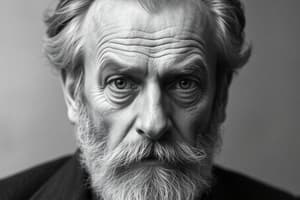Podcast
Questions and Answers
According to Heidegger, what is required to assert or know the truth about an object?
According to Heidegger, what is required to assert or know the truth about an object?
- Understanding the object in its totality and contexts (correct)
- Relying on expert opinions about the object
- Considering only the most prominent aspect of the object
- Ensuring correspondence between one's thought and the object
How does Michel Foucault describe truth?
How does Michel Foucault describe truth?
- As the correspondence between one's thought and the object
- As the agreement among experts about an object
- As a system of ordered procedures for the production, regulation, and distribution of statements (correct)
- As the power to control information about an object
In the context of Heidegger's view of truth, why is it not enough to simply say 'The grass is green' to assert its truth?
In the context of Heidegger's view of truth, why is it not enough to simply say 'The grass is green' to assert its truth?
- One must consider other aspects of one's experience of grass (correct)
- The truth of the grass depends on expert opinions
- The color of the grass is not relevant to its truth
- The statement 'The grass is green' is inherently untrue
How did medical experts support the government's vaccination program during the first two years of the COVID-19 pandemic?
How did medical experts support the government's vaccination program during the first two years of the COVID-19 pandemic?
According to Heidegger, what is the implication of understanding truth as more than just correspondence between thought and reality?
According to Heidegger, what is the implication of understanding truth as more than just correspondence between thought and reality?
Flashcards are hidden until you start studying




